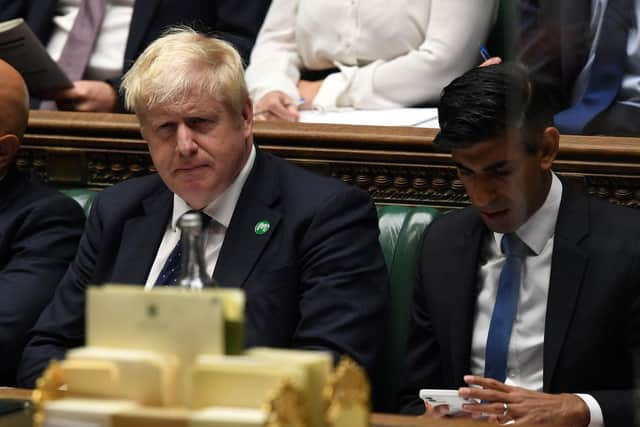Conservative leadership and Scottish independence: New economic report drops bombshells into both debates – John McLaren
It put a few cats among the pigeons, in terms of Tory hopes for tax cuts and SNP hopes for making independence more fiscally viable.
In its first ‘Fiscal Risks and Sustainability’ report since 2018, the OBR made clear that the UK debt and borrowing position is under control for now, thanks to tax rises imposed by the former Chancellor, Rishi Sunak. However, rising pressures – an ageing population, higher spending on defence, the transition to net-zero carbon emissions, etc – mean that it is further tax rises, rather than cuts, that will be needed in coming years.
Advertisement
Hide AdAdvertisement
Hide AdSome of the comments by OBR staff on publication will be uncomfortable for those Tory leadership challengers – and there have already been many – proposing tax cuts as a key part of their platform.
For example, Andy King, a member of the OBR’s Budget Responsibility Committee, states plainly: “In every case I can think of, when we look at tax cuts, the direct fiscal cost of cutting that tax outweighs the indirect fiscal benefit of improved economic activity that flows from it. While tax cuts may typically boost growth in some way they do not do so sufficiently to pay for themselves.” He concludes “tax cuts do not improve the long-term finances”.
Hence, there is no easy, ‘fairytale’ way out. This should lead to an interesting leadership race between tax cut ‘fantasists’ and fiscally prudent ‘realists’.
It also means that the on-going clash between the Boris Johnsons, who want to ‘spend, spend, spend’, and the Rishi Sunaks, who would only do so if it was paid for, rather than borrowed, is set to continue.


Each candidate has the chance to set out a long-term economic and fiscal strategy that says either ‘we need higher taxes to pay for higher, post-Covid, health and social care costs and for higher defence spending’ or that ‘we need to cut spending in other areas in order to cater for these pressures’.
The other position – to increase borrowing and debt in order to allow for lower taxes or more spending or both – will be an awkward one to take. The OBR believes that, even now, bringing UK debt back to 75 per cent of GDP, which would be around its pre-pandemic level, would require budget tightening equivalent to 1.5 per cent of gross domestic product – £37 billion in today’s money – at the beginning of each decade for the next 50 years.
Don’t expect anything like this level of analysis from candidates, but some acknowledgement of reality will be needed in order to appear credible.
There is already a growing opposition to Sunak’s policy of raising corporation tax from 19 to 24 per cent, which is antithetical to many Tories views, and some want to cut it to 15 per cent. That may be too far, and is at the limit of the Organisation for Economic Co-operation and Development’s (OECD) new global minimum rate, but some shift could provide a symbolic change in tack without being too expensive.
Advertisement
Hide AdAdvertisement
Hide AdThe reality is that it is a revival in productivity that is the key to renewed growth and improving standards of living and this will take a lot more than a few marginal tax cuts to resolve.
Where the OBR is making Indyref2 more interesting is with its higher energy price forecast variants. The new report illustrates that North Sea oil and gas-related revenues would, at a permanently higher oil price (around $140 a barrel), amount to over £10 billion a year. This would be more than sufficient to overcome Scotland’s relative ‘extra’ fiscal deficit, compared to the UK.
Even if oil prices show some weakening moving forwards, North Sea revenues appear to have re-entered the independence debate, as the OBR’s central £2-3 billion estimate of earlier in 2022 could easily rise to £5-6 billion a year by the autumn.
Of course, this is just one trajectory from a range of possibilities but it gives independence supporters a toehold in countering the question of how do you adjust the budget deficit to a more manageable position after independence?
The SNP’s Growth Commission report, published at a time of negligible expected oil revenues, went with the uncomfortable “decade of adjustment” proposal. This is a difficult sell and was very unpopular with some in the party – although they offered little in the way of an alternative.
The OBR report gives the SNP a possible escape route, without them being branded as fantasists.
There would still be uncomfortable contradictions to overcome, in particular over how this approach would fit in with the race to net-zero emissions. But a few comforting words around using such revenues as some sort of transition fund – for both independence and to a low-carbon economy – should not prove too difficult, especially given some of the political volte-faces that have occurred in recent years. It also has the advantage of a ‘do it now’ message, as this opportunity won’t last forever.
As if we haven’t been spoilt of late in terms of political earthquakes, the following months promise a few more seismic tremors.
John McLaren is a political economist who has worked in the Treasury, the Scottish Office and for a variety of economic think tanks
Comments
Want to join the conversation? Please or to comment on this article.
